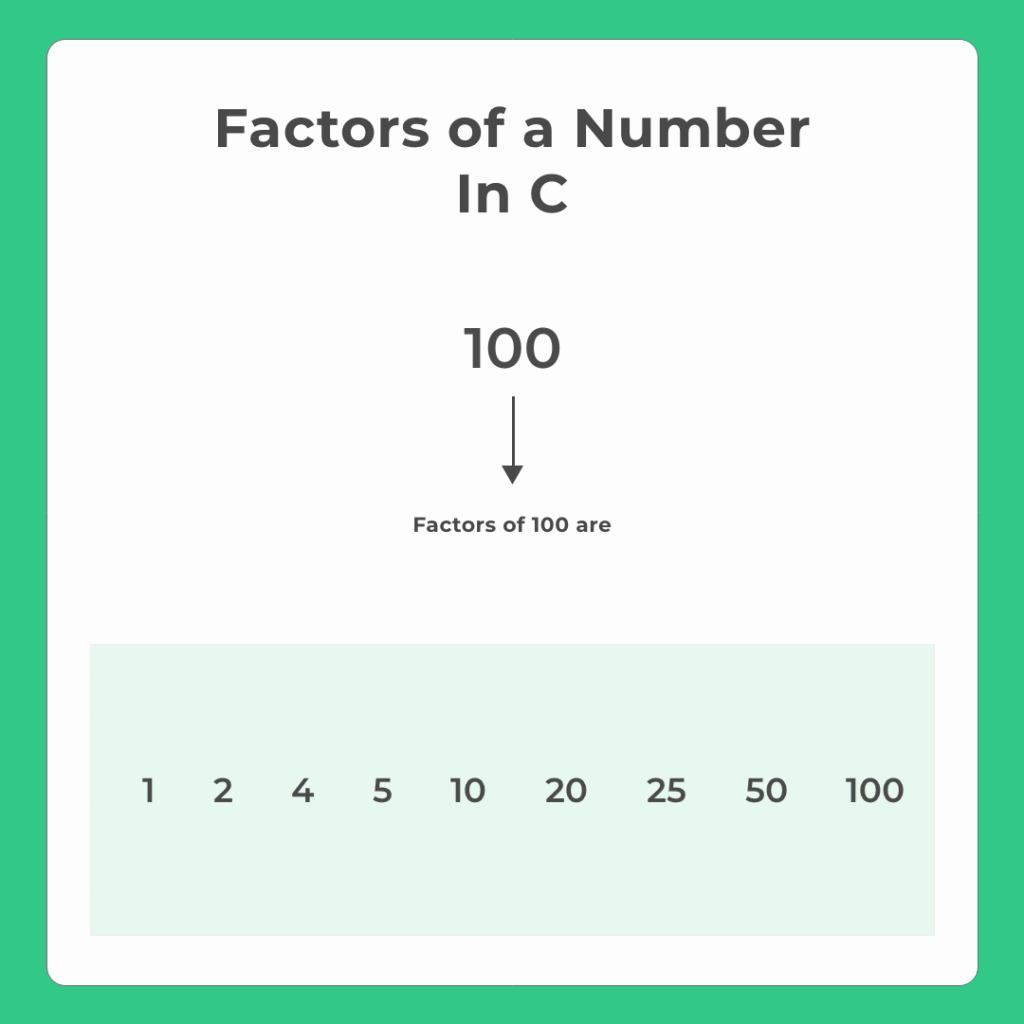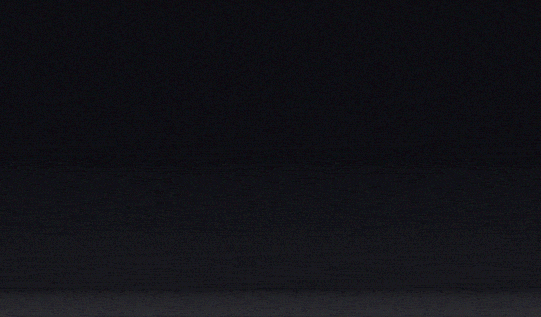C Program to Find the Factors of a Number
Factors of a Number in C
Here, in this page, we will discuss the program to find factors of a number in C programming language. We will discuss different methods to find the factors of the given number.
Example :
- Input : 10
- Output : 1, 2, 5, 10

Methods Discussed
- Method 1: Checking factors b/w [1, num]
- Method 2: Checking factors b/w [1, num/2]
- Method 3: Checking factors b/w [1, √num] and pair optimization
- Method 4: Checking factors b/w [1, √num] and pair optimization with non jumbled result

Method 1 :
- Run a loop from i=1 to i=n.
- For, every i-th number check
- If (num % i==0) then, print that number
Time and Space Complexity :
- Time Complexity: O(n)
- Space Complexity: O(1)
Code in C
Run
#include <stdio.h>
//main Program
int main()
{
int n = 100;
printf("Factors of %d are : \n", n);
// finding and printing factors b/w 1 to num
for(int i = 1; i <= n; i++)
{
// if n is divisible by i, then i is a factor of n
if(n % i == 0)
printf("%d, ", i);
}
}
// Time Complexity: O(N)
// Space Complexity: O(1)
Output :
Factors of 100 are :
1, 2, 4, 5, 10, 20, 25, 50, 100,
Method 2 :
According to this method, all the divisors (Excluding the number itself) of the number are before n/2.
- Run a loop from i=1 to i=n/2.
- For, every i-th number check
- If (num % i==0) then, print that number
- Finally print the number itself.
Time and Space Complexity :
- Time Complexity: O(n)
- Space Complexity: O(1)
Code in C
Run
#include <stdio.h>
int main()
{
int num = 100;
printf("Factors of %d are : \n", num);
// finding and printing factors b/w 1 to num/2
for(int i = 1; i <= num/2; i++)
{
// if num is divisible by i, then i is a factor of num
if(num % i == 0)
printf("%d, ", i);
}
// print the number itself too
printf("%d", num);
return 0;
}
// Time Complexity: O(N)
// Space Complexity: O(1)
// This method is better than previous method, even though the time complexity is the same
// it runs half lesser loop than previous method
// ran for loop num times, however, this runs num/2 timesOutput :
Factors of 100 are :
1, 2, 4, 5, 10, 20, 25, 50, 100,
Prime Course Trailer
Related Banners
Get PrepInsta Prime & get Access to all 200+ courses offered by PrepInsta in One Subscription
Method 3 :
- Run a loop from i=1 to i=sqrt(n).
- For, every i-th number check,
- If (num%i==0) then, check if(num/i != i) then print i, otherwise print i and n/i
Note – Issue it prints the factors in jumbled order (check output)
Time and Space Complexity :
- Time Complexity : O(sqrt(n))
- Space Complexity : O(1)
Code in C
Run
#include <stdio.h>
#include <math.h>
void printFact(int n){
for(int i = 1; i <= sqrt(n); ++i)
{
if (n % i == 0){
// If both pair of factors are equal then we just print
// once, example for 100 : (a, b) : (10, 10)
// 10 should be printed just once
if(i == n / i)
printf("%d, ",i);
// else print both the pairs
else
printf("%d, %d, ",i, n/i);
}
}
}
int main()
{
int n = 100;
printFact(n);
}
// Time Complexity: O(sqrt(N))
// Space Complexity: O(1)
// Issue : The order of factors are jumbled
Output :
1, 100, 2, 50, 4, 25, 5, 20, 10,
Method 4 :
This method solves the problem caused by the previous method where factors were printed in jumbled order.
Time and Space Complexity :
- Time Complexity : O(sqrt(n))
- Space Complexity : O(1)
Code in C
Run
#include <stdio.h>
#include <math.h>
void printFact(int n){
// Same i used in other for loop
int i;
// to avoid double printing
int flag = 0;
for(i = 1; i <= sqrt(n); i++)
{
if (n % i == 0)
printf("%d, ", i);
// To avoid double printing of equal pairs
// Example (10,10) we only want to print once
if(i == n/i)
flag = 1;
}
// if flag is '1' then we had double pairs like (10,10)
// we should do i-- so as not to do double printing of pair divisor
// doing i -=2 rather than i-- as in previous for loop we exited
// with i++, example, i = 10 became 11 and we need to start with 9
// so as to ignore 10 as its a double pair
if(flag)
i -= 2;
// printing pairs
for(;i>=1;i--)
{
if (n % i == 0)
printf("%d, ", n/i);
}
}
//main Program
int main()
{
int n = 100;
printFact(n);
}
// Time Complexity: O(sqrt(N))
// Space Complexity: O(1)Output :
1, 2, 4, 5, 10, 20, 25, 50, 100,
- Positive or Negative number: C | C++ | Java | Python
- Even or Odd number: C | C++ | Java | Python
- Sum of First N Natural numbers: C | C++ | Java | Python
- Sum of N natural numbers: C | C++ | Java | Python
- Sum of numbers in a given range: C | C++ | Java | Python
- Greatest of two numbers: C | C++ | Java | Python
- Greatest of the Three numbers: C | C++ | Java | Python
- Leap year or not: C | C++ | Java | Python
- Prime number: C | C++ | Java | Python
- Prime number within a given range: C | C++ | Java | Python
- Sum of digits of a number: C | C++ | Java | Python
- Reverse of a number : C | C++ | Java | Python
- Palindrome number: C | C++ | Java | Python
- Armstrong number : C | C++ | Java | Python
- Armstrong number in a given range : C | C++ | Java | Python
- Fibonacci Series upto nth term : C | C++ | Java | Python
- Find the Nth Term of the Fibonacci Series : C | C++ | Java | Python
- Factorial of a number : C | C++ | Java | Python
- Power of a number : C | C++ | Java | Python
- Factor of a number : C | C++ | Java | Python
- Strong number : C | C++ | Java | Python
- Perfect number : C | C++ | Java | Python
- Automorphic number : C | C++ | Java | Python
- Harshad number : C | C++ | Java | Python
- Abundant number : C| C++ | Java | Python
- Friendly pair : C | C++ | Java | Python






Login/Signup to comment